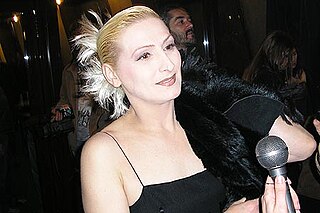
Halid Bešlić is a Bosnian folk singer and musician who has been performing professionally since 1979. Halid's singing career was one of the most successful in Yugoslavia, and continues today throughout the entire Balkan region.
Mirko Pajčin, known by his stage name Baja Mali Knindža, is a Serbian folk singer and songwriter. He is often described as part of the turbo-folk scene, and is known for his Serbian nationalist songs. His cousin was the pop-folk recording artist Ksenija Pajčin.
Nada Obrić is a Bosnian Serb folk singer.

Vladimir "Vlado" Georgiev is a Serbian singer-songwriter and producer. Georgiev remains one of the most prominent musicians in the Balkans.

Hajrudin "Hari" Varešanović is a Bosnian musician. Known for his impassioned lyrical tenor vocals, distinct stage presence and specific brand of poetic lyrics, Varešanović remains the vocal soloist, primary composer and lyricist for the musical group Hari Mata Hari.

Jadranka Stojaković was a Bosnian singer-songwriter popular in the former Yugoslavia, known for her unique voice. Her best known hits are "Sve smo mogli mi", "Što te nema", and "Bistre vode Bosnom teku".

Dragana Mirković is a Serbian pop-folk singer and entrepreneur. She rose to prominence in the eighties as a member of the popular collective Južni Vetar. Today, Mirković is recognised as one of the best-selling artists from the former Yugoslavia. Alongside her husband, she also founded a satellite music channel called DM SAT.

Hari Mata Hari is a Bosnian rock band. Hari Mata Hari is the stage name for the singer Hari Varešanović. The group originated from the city of Sarajevo, the capital of Bosnia and Herzegovina. The group has performed over 1,000 concerts and sold 5 million albums to date. Their songs are among the most famous and popular love ballads in the former Yugoslavia era. Hari Mata Hari was the representative of Bosnia and Herzegovina at the Eurovision Song Contest 2006 held in Athens, Greece. Coincidentally, hari mata hari is Malay for 'day of the sun, or Sunday'.
Sead "Sejo" Kalač is a pop-folk singer popular in the former Yugoslavia.

Neda Ukraden is a Serbian singer from Croatia. Her professional career stretches back to 1967.

Snežana Mišković, better known by her stage name Viktorija, is a Serbian female rock singer known for her raspy voice.
Branka Sovrlić is a Serbian folk singer.
Nikola "Sajko" Sarić is a Serbian singer, musician and television personality. He came to media attention as one of sixteen contestants on the B92's Operacija trijumf, the Balkan version of Endemol's Fame Academy. As one of four members of OT Band, he took part in Beovizija 2009, with the song "Blagoslov za kraj", but they placed second in the final.
Bisera Veletanlić is a Bosnian jazz singer, one of the greatest names of Yugoslav evergreen scene and the star of music festivals in the 1970s. She has been called "one of the most original singers from the Balkans".
Srđan Marjanović is a Serbian singer-songwriter from Belgrade.
Muharem Serbezovski, nicknamed Mumo, is a Muslim Roma singer, popular in former Yugoslavia. He is also a writer and translator and was briefly in Bosnian politics in the 2000s. Although born in Yugoslav Macedonia, he has been living in Sarajevo, since 1975.
Dragana Todorović, known by her stage name Jana, is a Serbian turbo-folk and pop folk singer.
Zorica Brunclik is a Serbian singer of folk music; both traditional and newly composed. Arguably one of the most famous ex-Yugoslavian artists, Zorica Brunclik is known for her singing voice, fashion style and bright pink hair.
Fahrudin Pecikoza is a Bosnian songwriter. He has written lyrics for Bosnian, Croatian and Serbian singers.
Mirjana Škorić, better known as Mira Škorić, is a Serbian pop-folk singer, who gained popularity in the 1990s and is best known for her hits like "Otkači" and "Manastir" (Monastery) from the 1993 album Ti si ko i ja. Throughout her career, Škorić has also collaborated with some of the biggest regional singers such as Ceca, Lepa Brena, Vesna Zmijanac, Aca Lukas, Željko Bebek and Ana Bekuta.







